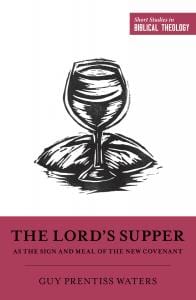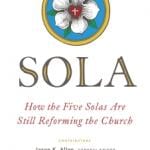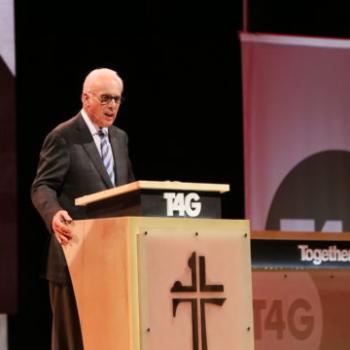Just what is the Lord’s Supper? Why does it matter? How does it fit in with the rest of the Bible? These and another questions are tackled by Guy Prentiss Waters’s little book The Lord’s Supper as the Sign and Meal of the New Covenant. This book is part of the Short Studies in Biblical Theology series from Crossway (we’ve reviewed at least one of these here).

The title of this book is something of a misnomer. Although the book does discuss the Lord’s Supper, at least 2/3 of the text is dedicated to explaining the nature of covenants. We first get an overview of what covenants are, and what kinds of covenants are found in Scripture (the Adamic, the Noahic, etc). Next, Waters gives us an introduction to covenant signs (e.g. circumcision, the Passover, baptism, and the Lord’s Supper), followed by a survey of covenant meals, especially in the Old Testament. Finally, there is a chapter on the Lord’ Supper itself and another on practical application for the church.
Overall, this book is excellent a provides a good survey of both covenant theology and the place of the Lord’s Supper in that theology for individuals and for the local church. Waters’s discussion of the Supper itself is especially helpful:
“First, it is a covenant meal in which individual believers, by faith, commune with Christ to their spiritual nourishment. This meal is designed not to create faith anew but to strengthen the existing faith of Christ’s disciples. Second, it is a family meal in which the covenant family of God gathers together under the oversight of God in Christ. The Supper should serve then to promote the familial bonds that exist within the people of God. Third, the Lord’s Supper serves to distinguish the church as a society that God has set apart from the world around them. This declaration is not one of smug pride of self-righteousness. On the contrary, it is the church testifying to the saving grace of God, which draws sinners from their sin to the Lord Jesus Christ.” (96)
This definition is important, and needs to be taught more clearly in contemporary Evangelical churches.
Waters also does a good job introducing a discussion of the covenants and their place in God’s plan of salvation without wading too far into the Covenant Theology/New Covenant Theology waters. (Presumably a book in this series on baptism would not be able to avoid the same discussion.) After all, it’s one thing to say that the signs of the old covenants point to Christ (they do, of course). It’s another thing to say that these old covenant signs point to and inform the new covenant signs (they… might, though to say yes or no to that is to pick a side in the Covenant Theology/New Covenant Theology debate). Passover and circumcision point forward to Christ and backward to the Exodus. Baptism and the Lord’s Supper point backward to the cross and forward to the second coming. There’s no disagreement about any of those issues. But do Passover and circumcision point to the Lord’s Supper and baptism? Well…
One quibble. Waters says a variation of this a couple of times:
“Here we see an important difference between the Passover meal and the Lord’s Supper. The Passover meal looked forward to the Messiah who had yet to come in history. The Lord’s Supper looks back to the Messiah who has already come in history. We live not in the era of promise but in the era of fulfillment.” (90)
Elsewhere even in this text, Waters notes that Passover looks both backwards and forwards. That is, it does look forward to the coming Messiah, but it also (perhaps even primarily, at least from the perspective of the pre-Incarnation participants) looks backwards to the Exodus from Egypt. Waters also points out that the Lord’s Supper both looks back to the Messiah, but it also looks forward to the second coming (1 Corinthians 11:26). Which I think suggests that this isn’t really a “difference” between the Lord’s Supper and Passover (which isn’t to say they’re not different–just that the direction they point isn’t an aspect of that difference).
That quibble aside, this book is a great place to begin thinking about the Lord’s Supper in the context of the Bible as a whole.
Highly recommended.
Dr. Coyle Neal is co-host of the City of Man Podcast and an Associate Professor of Political Science at Southwest Baptist University in Bolivar, MO













